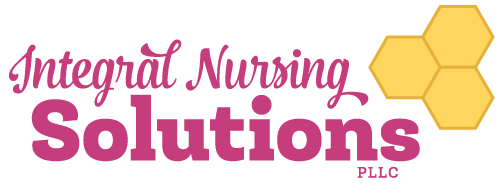Empower Your Self by Addressing Your Eating Issues
For some of us Self care around food and eating creates a conundrum. Competent and successful in most areas of life, if you cannot stop eating when you are full… or despite knowing a lot about nutrition, you are unable to apply that information, you may have an eating disorder and you are not alone. According to the ANA Healthy Nurse, Healthy Nation website, there are 3.6 million nurses, and we “are less healthy than the average American. Research shows that nurses are more likely to be overweight, have higher levels of stress, and get less sleep.” Self care supports your ability to respond rather than react to the circumstances of your life. It enhances your sense of integrity with yourself, nourishes your sense of well being and may be reflected in positive self-esteem, having energy, and feeling connected to others. Is self care around the topic of nutrition a huge challenge for you? If you experience discouragement, shame, confusion and depression related to your weight, if you cannot eat like “normal people” and your weight is unhealthy for you, you may have an eating disorder, and you are not alone. 
Eating disorders are now recognized to be both medical and psychiatric and serious health issues. Eating disorders affect men and women, can occur at any time in the life span and the symptoms can be quite varied. It is beyond the scope of this blog to go into the details of the various manifestations eating disorders other than to say Eating Disorder Not Otherwise Specified (EDNOS), has been revised and refined in the DSMV to Other Specified Feeding and Eating Disorder (OSFED). It is applied when an individual’s symptoms cause significant distress but do not fit neatly within the strict criteria for anorexia, bulimia, ARFID , Binge Eating Disorders (BED) or Compulsive Overeating. For most people, admitting to having an eating disorder is difficult and emotionally painful. For some, their eating disorders may be or will become addictions. However, knowing that it is not just a matter of willpower, self control or a moral issue can remove some of the stigma. You have a treatable disease and you are not alone. With support in living with the disease of an eating disorder, you can get help in applying all of the accumulated information you have about healthy eating. You can recover. Your recovery is Self care.
I remember sneaking back to the break room to get more of whatever was in there. I remember staff gatherings where I was paying more attention to the food on the table than to my interesting and caring colleagues who brought in their favorite specialties. I sensed something was wrong with me because I could not stop eating once I started. I tried many diets and eating behaviors to try to gain control of my intake. Puzzled by this, I eventually began to experience shame as I could no longer manage not only my eating but the weight. Years later, I came to understand that I had an eating disorder.
Here are some of the symptoms of Compulsive Over Eating, BED and OSFED:
- Regularly eating large amounts of food and unable to stop when you feel full- experiencing a lack of control.
- A constant concern about food and weight, restricting food and obsessing about caloric intake.
- Do you meet the diagnostic criteria for anorexia nervosa, but your weight is in the normal range?
- Meet the diagnostic criteria for anorexia nervosa, but still having your period.
- Chewing food and then spitting it out, or vomiting to maintain a normal body weight.
- Eating normally with others and then eat more when you are alone.
- Sneak eating.
- Eating quickly so that you can eat more before feeling full.
- Experiencing embarrassment, guilt, disgust, depression and/or shame over your inability to control your eating after an episode of over eating.
- Obese and at risk for the consequent health issues of heart disease, diabetes type II, joint and muscle pain, cancer, osteoarthritis etc. and unable to get a handle on getting to a normal weight.
- Feeling like you are alone with your eating issue.
If you think you might have an eating disorder, you have a number of options. You can discuss this with your primary care provider. You can check out Over Eaters Anonymous which despite the name, welcomes all who have issues with food by working a 12 Step Program which is “a spiritual solution to a physical problem”, you can do nothing about the issue and of course you will continue to explore the issue until you find a solution that works for you.
 Vitality in Progress: Healing and Preventing Burnout for Nurses is a 9 week program that supports nurses in developing their personalized Self care plan. Some participants have chosen to address their eating patterns in the program. With successful completion of the program, you also receive 39 CNE’s! Check us out, as the next series starts in January 2018 and there is an early bird discount.
Vitality in Progress: Healing and Preventing Burnout for Nurses is a 9 week program that supports nurses in developing their personalized Self care plan. Some participants have chosen to address their eating patterns in the program. With successful completion of the program, you also receive 39 CNE’s! Check us out, as the next series starts in January 2018 and there is an early bird discount.
In the meantime, Join our Free Virtual Connecting Weekly Call-in for Nurses
Please share with us your experiences of your challenges with healthy eating and the solutions you have found.
Have a beautiful week taking good care of your precious Self by eating healthy foods in moderation.
With love, Padma
Other Resources:
Nurses and Addictions: https://www.drugrehab.com/addiction/nurses/
A Nurse’s Guide to Eating Disorders http://onlinedegrees.bradley.edu/nursing/dnp/a-nurses-guide-to-eating-disorders/




 When are you going to nurture your Self with a retreat?
When are you going to nurture your Self with a retreat?
 A few years ago a friend and I decided we wanted to share a retreat and to deepen our friendship. We designed a schedule of meditation, walking, and listening to a series of talks by a healer we had heard of. We tent camped in a state park, in silence for a weekend. It rained the full weekend, and except for laughter, we maintained our noble silence and had a memorable, enriching and powerful shared experience of a deeper friendship.
A few years ago a friend and I decided we wanted to share a retreat and to deepen our friendship. We designed a schedule of meditation, walking, and listening to a series of talks by a healer we had heard of. We tent camped in a state park, in silence for a weekend. It rained the full weekend, and except for laughter, we maintained our noble silence and had a memorable, enriching and powerful shared experience of a deeper friendship.